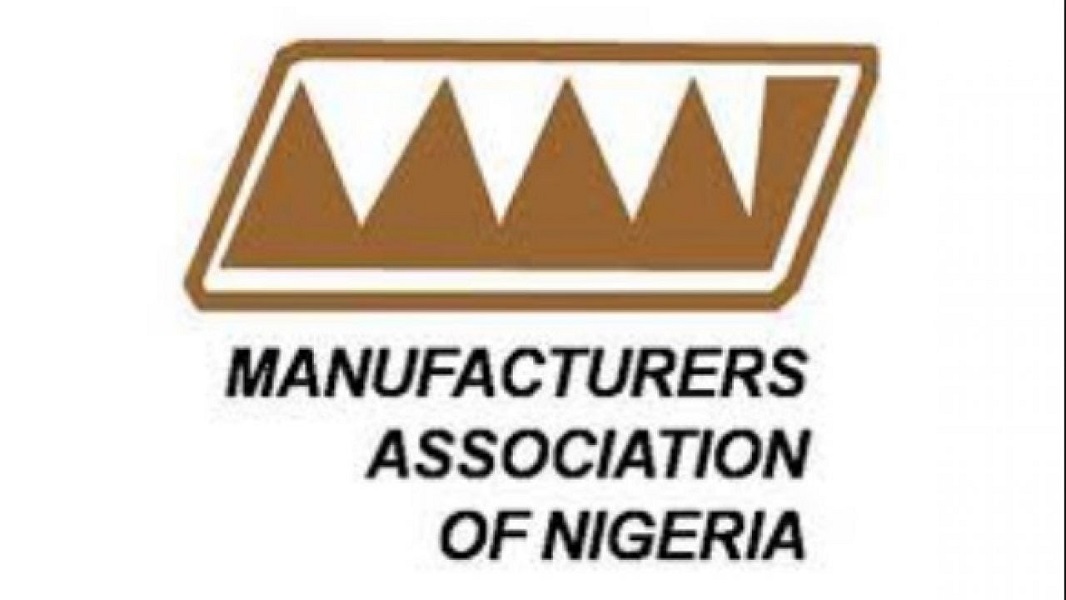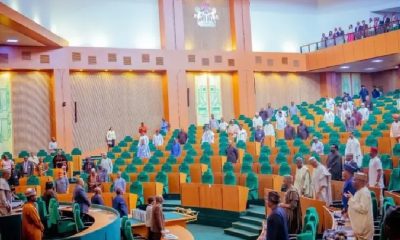News
Job Losses, Factory Closures Loom As Unsold Goods Pile Up — MAN

Against the backdrop of sustained pressure in the foreign exchange market and high cost of production, the Manufacturers Association of Nigeria, MAN has indicated that inventory of unsold goods is escalating to levels now threatening the existence of companies operating in the production sector of the economy with attendant job losses.
Financial Vanguard’s findings show that as of the weekend the foreign exchange market had recorded over 254 per cent plunge in the value of the naira since flotation of the currency by the Central Bank of Nigeria (CBN) in June 2023.
Recall that the naira traded for N471 per dollar in the official I&E market on June 13, 2023 before the floatation of the currency, but exchanged for N1,665.50 to a dollar as at February 23, 2024 on the Nigerian Foreign Exchange Market (NAFEM), indicating a depreciation of more than 253.6 per cent over the eight-month period.
The forex crisis is also stoking inflation, and coupled with high energy costs, purchasing power has continued plummet, stifling demand for goods.
Speaking on the impact of this development on the manufacturing sector, Director General, MAN, Segun Ajayi-Kadir, said: “There are reports that across the board, many warehouses and plants of many manufacturing firms are stockpiled with unsold goods manufactured last year.
“The development is as a result of the devastating effects of the exchange rate crisis, inflation, fake and sub-standard goods, smuggling and other macro-economics challenges.
“These had put many manufacturers in a great dilemma in the current year as they are applying brakes on production by watching keenly events in the country to know if there would be improvement in sales in order to create space for fresh production for the year.”
Ajayi-Kadir warned that manufacturers may be forced to halt making new products, leading to workforce down-sizing, since production lines are becoming inactive.
“The continued naira depreciation against the dollar, and the general forex volatility were forcing manufacturers to have a rethink. No genuine manufacturer could operate successfully and make profit under the current scenario, whereby the naira has been falling sharply more than expected in the country,” he stated.
Highlighting challenges in accessing foreign exchange (forex), Ajayi-Kadir disclosed that manufacturers primarily obtain forex through Bureaux De Change (BDCs), noting that banks typically offer less than 20 per cent of the required amount.
No respite yet There seems to be no respite in sight as the International Monetary Fund (IMF) has warned that the exchange rate of the Naira may further depreciate by about 35 per cent this year, adding that this could lead to inflation rate peaking at 44 per cent.
“Given the absence of local production and the recent liberalization of commodity imports, the exchange rate would likely depreciate further – by an estimated 35 per cent in 2024 – and contribute to a further sharp rise in inflation, peaking at 44 per cent, before monetary policy is eventually tightened sharply,” IMF stated in its February 2024 Post-Financing Assessment and Staff Report.
Financial Vanguard reports that manufacturing companies have been adopting diverse responses to the situation. A good number of them have been investing in backward integration for sourcing raw materials locally instead of imports that strangulate their finances due to the high exchange rate and scarcity of foreign currency. But some of the manufacturers are scaling down their operations while many have actually suspended operations.
Companies’ woes Against the backdrop of the forex crisis, Nigerian Breweries (NB) Plc recently issued a new price review notification to all its customers in the West Zone.
In the notice to its consumers, NB said: “This is to inform you that we are constrained to review the prices of some of our stock keeping units (SKUs) with effect from Monday 19th February, 2024. This review has become necessary because of continued rising input costs and the need to mitigate the impact.”
SKU is a unique identifier used to track inventory within a business. Nigerian Breweries produces major alcoholic beverages like Star Lager, Gulder, Legend Extra Stout, Heineken, Goldberg, Life, and Star Radler amongst others. It also produces non-alcoholic drinks like Maltina, Amstel Malta, Fayrouz, Climax Energy drink, and Malta Gold.
In a related development, in December 2023, Procter & Gamble (P&G) said it was leaving Nigeria, after just opening its diaper production line worth $300 million in Lagos in 2017. Other global conglomerates that have announced their exit from the country in the recent past include GSK Plc, Bayer AG and Sanofi SA.
Also last year, Unilever Plc cut some of the products manufactured in Nigeria, while Nestle SA has posted losses from its operations. The main reason for the exodus of these conglomerates is scarcity of dollars that they need to repatriate their earnings, with CBN still struggling to clear a backlog of demand for dollars companies require to pay debts and import raw materials.
This is in addition to a near complete absence of reliable electricity supply and congestion at the nation’s ports.
On short-term measures to alleviate challenges faced by manufacturers, Ajayi-Kadir recommended freezing the rates at which the import of raw materials, spares, and machines is calculated. According to him, this would provide stability for manufacturers, shielding them from the impact of fluctuating currency values and fostering a more predictable business environment.
He also proposed that the government open new credit sources with rates not exceeding 5 per cent, providing quick wins to alleviate pressure on the manufacturing sector. “Additionally, the government should remove the price verification porter because it’s causing companies to shut down, they are not able to import those raw materials.
“The government should also open new windows for us to source our credit at rates that are not lower and that are not higher than 5 percent. “These are very quick wins that the government can do that can lower the pressure that is upon the manufacturing sector,” he said.
The MAN DG also emphasized the importance of promoting domestic production. “Historically, we have not prioritized our domestic economy or encouraged local production. Without local production, we cannot control the exchange rate or achieve a positive rate. Our reliance on imports leads to continuous pressure on the Naira to pursue the Dollar, resulting in an unfavorable exchange rate,” he stated.
On his part, Dr Femi Egbesola, President, Association of Small Business Owners of Nigeria (ASBON), blames the forex crisis on unrealistic and inconsistent fiscal and monetary policies. “So many policies of the government this past time have done more damage than good to the forex market.
To get a different result, something must just be done differently,” he said. On what the forex crisis portends for small businesses, Eg-besola stated: “Existence of more micro and small businesses are further threatened. Many more businesses are closing down or are in an ailing situation.
“This results to more job losses, loss of revenue to government because dead businesses can’t pay taxes and levies, discourages foreign investment and local investors, increases crime and insecurity, for jobless ones will look for other means of survival, mostly illegal means, owners of businesses are now abandoning their unproductive and unprofitable businesses to relocate overseas, higher inflation rate and more.”
He advised that small businesses need to be more creative and innovative now more than ever before. “Business owners need to begin to diversify to foods and daily need products. More attention should be on exportable products that can earn forex.
“SMEs should adopt the use of technology now more than ever before. Technology adoption will significantly reduce business cost. SMEs need to invest in online marketing and advertising of their products and services. This breaks borders and opens bigger markets. “SMEs should begin to take advantage of the African Free Continental Free Trade Area (AfCFTA) opportunities to sell their products and services to other African countries without the statutory levies and taxes. This will lead to increase in sales and eventually push up productivity and profitability,” he added.
In his comment, Dr Muda Yusuf, CEO, Centre for the Promotion of Private Enterprise (CPPE), said: “The depreciation of the naira exchange rate is an inevitable outcome of the current economic reforms. The primary objective is to correct the distortions in the foreign exchange market which had lingered for some time.
Admittedly, the economic, social and political costs are quite high. “The main anchor of the reform is the unification of the exchange rate, between the official and parallel markets. The challenge has been that our foreign reserves are not robust enough to make the process less painful.
The economy is still grappling with a major forex liquidity crisis.” Yusuf added that the implications of the current crisis for investors and citizens are multifaceted. “They include: intense inflationary pressures; escalating production and operating costs across all sectors of the economy; erosion of profit margins as businesses could not significantly transfer increased costs to consumers.
“Businesses that have foreign exchange exposure are under severe pressure; businesses with foreign shareholders are struggling to deliver value to their offshore shareholders because of the erosion of domestic currency value; and planning has become difficult for many investors because of the current volatilities.”
He said that the current policy reforms are expected to ensure stability in the short to medium term, adding however that the reform architecture needs to be periodically reviewed in the light of the high social costs and market imperfections.
“The trade policy window should be explored to mitigate the current escalating prices and production costs. The recent upward review of the exchange rate benchmark for the import duty computation should be reviewed. Trade costs should generally be moderated to give succour to businesses and citizens.
“Complete and total floatation of the currency should be avoided in the light of glaring market imperfections. CBN should commit to the option of a managed float. The policy choice of complete floating of the naira requires a rethink in the light of the current inflationary outcomes, volatility and mark.
News
Security operatives chase away thugs from PDP HQ amid leadership crisis

Operatives of the Police, Department of State Service, and Nigeria Civil Defence Corps, on Wednesday, cleared thugs from the Peoples Democratic Party’s headquarters in Abuja.
A party source, speaking on the condition of anonymity due to fear of victimisation, revealed to The PUNCH on Wednesday that the thugs were reportedly recruited to block members of the National Working Committee from entering the party headquarters for their meetings.
The crisis within the PDP has deeply affected all party organs, with recent developments seeing Samuel Anyanwu and former National Youth Leader Sunday Ude-Okoye both claiming the position of PDP National Secretary.
While the Court of Appeal in Enugu upheld Ude-Okoye as the National Secretary, Anyanwu took the matter to the Supreme Court.
As a result, the Supreme Court reserved its judgment on Monday, with the date to be communicated to the parties involved.
“The party staff, with the support of security personnel, confronted the thugs and dispersed them,” the source said.
At the party’s national headquarters, a reporter from The PUNCH noticed a heavy presence of security personnel.
Around six Nigeria Police, DSS, and NSCDC vans were stationed near Wadata Plaza, Wuse Zone 5, Abuja.
The Acting National Chairman, Umar Damagum, is currently leading the NWC meeting, with Ude-Okoye attending as the National Secretary.
Details shortly…
News
Authentic Lawmakers Resume Sitting At Rivers Assembly After Shutting Out Governor Fubara From Presenting 2025 Budget

The Rivers State House of Assembly on Wednesday resumed plenary amid reports that lawmakers loyal to the Minister of the Federal Capital Territory (FCT), Nyesom Wike, blocked Governor Siminalayi Fubara from presenting the 2025 budget.
A video seen by an online medium showed the lawmakers already seated inside the chamber while Speaker Martin Amaewhule and other officials carrying the mace made their way into the hall.
The development follows an earlier dramatic standoff at the Assembly complex, where Fubara accused the legislators of locking the gates to prevent him from presenting the 2025 Appropriation Bill.
SaharaReporters had reported that the governor, who arrived at the Assembly complex early in the morning, expressed frustration over the situation.
He stated that he had made multiple attempts to reach Speaker Amaewhule and other lawmakers before his arrival.
“I have made several attempts—by phone calls and through official letters—to reach the speaker and other members. But it is unfortunate that the gate is completely sealed, and there is no sign that anything is going to happen today,” Fubara had said.
He added that the budget presentation was crucial for the state’s development, warning that failure to pass the appropriation bill would disrupt governance and slow ongoing projects.
A video of the incident, shared by a Facebook user, Prince Yemi Itodo, showed the Assembly complex under lock and key, with security operatives reportedly ordered to vacate the premises.
“The implication is that the state will be run without a budget, which will slow development and lead to financial irregularities,” he wrote.
The blockade is the latest escalation in the ongoing political battle between Fubara and his predecessor, Wike, whose loyalists dominate the Assembly.
The crisis has also drawn the attention of President Bola Tinubu, who recently urged both sides to implement a Supreme Court-backed political agreement aimed at resolving the dispute.
Despite Tinubu’s intervention and Fubara’s call for dialogue, Wednesday’s sitting suggests the battle for control of the Rivers State government is far from over.
News
Produce Hudu by March 27 or face contempt charges, Court cautions IG

The High Court of Justice of Adamawa State, sitting in the Yola Judicial Division, has issued a significant court order directing the Inspector General of Police of the Federal Republic of Nigeria to arrest and produce Mr. Hudu Yunusa Ari, the former Resident Electoral Commissioner (REC) of Adamawa State, before the court.
The order, issued on May 15, 2024, by Hon. Justice Benjamin L. Manji, stems from an ex parte application filed by the State in the ongoing case numbered HC/ADSY/9C/2024.
The legal proceedings against Mr. Hudu Yunusa Ari began following a complaint lodged by the State on February 20, 2024. The case gained prominence due to allegations surrounding Ari’s conduct during the 2023 governorship election in Adamawa State.
Ari was directed by the court to appear on May 3, 2024, but he reportedly left the courtroom and did not return
A sworn affidavit deposed by Ishaq Abdullahi Jada, the Director of Public Prosecution in the Ministry of Justice, Yola, detailed the circumstances leading to the court’s intervention.
The affidavit, supported by a 17-paragraph counter-affidavit and an exhibit marked “A,” highlighted Ari’s alleged failure to appear before the court despite being summoned.
According to the affidavit, Ari was directed by the court to appear on May 3, 2024, but he reportedly left the courtroom and did not return. Subsequent efforts to locate him proved futile, with the deponent asserting that Ari’s actions constituted a deliberate attempt to evade justice.
The application, moved by counsel L.D. Nzadon Esq., urged the court to grant a warrant for Ari’s arrest, emphasizing the necessity of his presence to stand trial for the charges preferred against him.
Presiding over the matter on May 15, 2024, Hon. Justice Benjamin L. Manji carefully considered the ex parte application and the supporting affidavit. Convinced of the application’s merit and the need for a favorable exercise of judicial discretion, the judge granted the prayers as requested.
The court issued the following orders:
A warrant of arrest was issued against the Defendant, Hudu Yunusa Ari.
The Inspector General of Police was directed to immediately effect the arrest and produce Ari before the Honourable Court on the next adjourned date.
The matter was adjourned to May 29, 2024, for arraignment.
The order was issued under the hand of the Hon. Judge and the seal of the court, with a certified true copy signed by Fadimatu Muhammad, the Principal Registrar.
In a related development, on February 28, 2025, the court revisited the case, granting leave for the service of Form 48 (Notice of Consequence of Disobedience of Court Order) on the Inspector General of Police via substituted means.
This notice, to be published in two national dailies—Daily Trust and Vanguard Newspapers—warns that failure to obey the court’s directions will result in contempt, potentially leading to imprisonment. The return date for this order is set for March 27, 2025.
The issuance of the Notice of Consequences of Disobedience of Court Order against Ari, pursuant to Order IX Rule 13 of the Sheriffs and Civil Process Act
Additionally, an earlier application dated January 23, 2025, from Messrs Nzadon, Laori & Associates, counsel to the prosecution, formally requested the issuance of the Notice of Consequences of Disobedience of Court Order against Ari, pursuant to Order IX Rule 13 of the Sheriffs and Civil Process Act.
The court’s directive underscores the judiciary’s resolve to ensure that individuals, regardless of their status, are held accountable under the law. Mr. Hudu Yunusa Ari’s alleged evasion has sparked widespread discussion, with many viewing the case as a test of the rule of law in Nigeria.
The involvement of the Inspector General of Police on contempt proceedings highlights the seriousness with which the matter is being treated, as law enforcement agencies are now tasked with locating and apprehending the former REC.
As the adjourned date of March 27th 2025 approaches—pending further updates—the public awaits the outcome of this high-profile case.
The court’s latest order, effective as of February 28, 2025, further intensifies the pressure on the police to comply, with potential legal consequences looming if the directive is not adhered to.
For now, all eyes are on the Inspector General of Police to fulfill the court’s mandate and bring Mr. Hudu Yunusa Ari before the High Court of Adamawa State to answer to the charges against him.
-

 News6 hours ago
News6 hours agoVideo: WATCH tearful Senator Natasha reporting Akpabio to IPU
-

 News19 hours ago
News19 hours agoNSITF vows prompt payment of compensation, presents cheque to National Assembly staff
-

 News12 hours ago
News12 hours agoTinubu to Fubara: comply fully with S’Court verdict
-

 News21 hours ago
News21 hours ago‘We Gave You Enough Time,’ Wike Orders Residents To Evacuate From Right Of Way
-

 News19 hours ago
News19 hours agoBill To Establish Federal College of Entrepreneurship Ntigha Pass Second Reading
-

 News24 hours ago
News24 hours agoAbomination ! “I’ve forgiven my wife for sleeping with other men”, says Ijoba Lande
-

 News17 hours ago
News17 hours agoJust in: Tinubu meets with PANDEF leaders at Aso Rock
-

 News13 hours ago
News13 hours agoOdilli in trouble as Supreme Court gives EFCC the nod probe to ex-Gov






